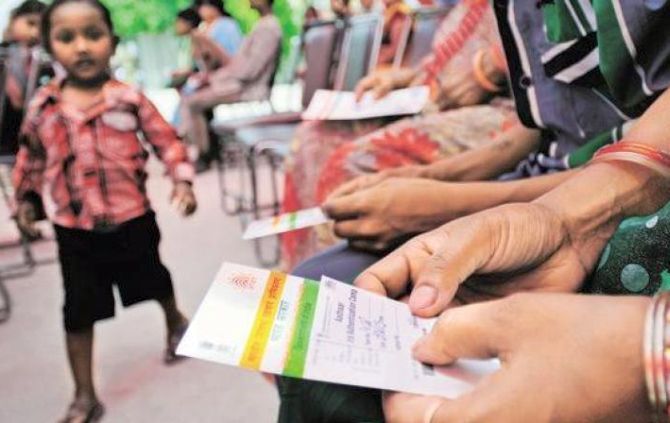
The Supreme Court is likely to pronounce its crucial verdict on Wednesday on a batch of pleas challenging the constitutional validity of Centre's flagship Aadhaar scheme and its enabling 2016 law.
Apart from Aadhaar, SC is also likely to pronounce verdicts on a number of other significant issues, including live streaming of court proceedings and granting quota benefits in promotions to SC/ST employees.
The verdict will also be delivered on a question whether the grant of stay on the conviction of a disqualified lawmaker by an appellate court would revive his or her membership of a House.
The apex court is also likely to deliver its decision on the plea of senior Congress leader Ahmed Patel challenging the Gujarat high court order refusing to quash a petition of a Bharatiya Janata Party leader against his election to the Rajya Sabha.
A five-judge constitution bench headed by Chief Justice Dipak Misra had on May 10 reserved the verdict on the constitutional validity of Aadhaar after a marathon hearing that went on for 38 days, spanning four-and-half months.
As many as 31 petitions, including one by former high court judge K S Puttaswamy, have been filed in the matter.
When the judgment was reserved by the court, Attorney General K K Venugopal had told the bench, which also comprised Justices A K Sikri, A M Khanwilkar, D Y Chandrachud and Ashok Bhushan, that this matter had become the 'second longest' one in terms of days of hearing after the historic Kesavananda Bharati case of 1973.
The Kesavananda Bharati case, which was heard by a 13-judge bench, by a majority of 7:6 had propounded the doctrine of the 'Basic Structure and of the Constitution'. It had held that the amendments which may affect this structure were subject to judicial review.
A battery of senior lawyers, including Shyam Divan, Gopal Subramaniam, Kapil Sibal, P Chidambaram, Arvind Datar, K V Vishwanath, Anand Grover, Sajan Poovayya and a few others, had argued on behalf of the petitioners opposing the Aadhaar Scheme on various grounds.
Besides the former HC judge, the top lawyers argued for petitioners, who included Magsaysay awardee Shanta Sinha, feminist researcher Kalyani Sen Menon, social activists Aruna Roy, Nikhil De, Nachiket Udupa and Communist Party of India leader Binoy Visman.
A key argument against the Aadhaar scheme was that it was violative of the nine-judge bench verdict that had held that Right to Privacy is a fundamental right under the Constitution.
The Centre, the Unique Identification Authority of India, the governments of Maharashtra and Gujarat and the Reserve Bank of India had argued in favour of the Aadhaar (Targeted Delivery of Financial and Other Subsidies, Benefits And Services) Act, 2016 and were represented by the Attorney General, Additional Solicitor General Tushar Mehta, senior advocates Rakesh Dwivedi and Jayant Bhushan and lawyer Zoheb Hossain.
During the arguments, the Centre had strongly defended its decision to seed Aadhaar numbers with mobile phones, telling the top court that it could have been hauled up for contempt if the verification of mobile users was not undertaken by it.
However, the court had said that the government had misinterpreted its order and used it as a 'tool' to make Aadhaar mandatory for mobile users.
The court had also not agreed prima facie with the government's contention that the Aadhaar law was correctly termed as a Money Bill by the Lok Sabha Speaker as it dealt with "targeted delivery of subsidies" for which funds came from the Consolidated Fund of India.
The counsel for one of the petitioners had termed Aadhaar as 'an electronic leash' and said that the government could completely destroy an individual by 'switching off' the 12-digit unique identifier number.
On the other hand, the Centre had said that the law was valid and allowed minimal invasion to ensure the right to life of millions of Indians by ensuring seamless delivery of subsidies, benefits and services to the poorest of poor.
The Supreme Court is also likely to pronounce on Wednesday its verdict on a question whether grant of stay on the conviction of a disqualified lawmaker by an appellate court would revive his or her membership of a House.
A three-judge bench headed by CJI Dipak Misra which had reserved its order on the plea filed by NGO Lok Prahari on July 23, will pronounce the verdict.
The top court while reserving the verdict on the plea of the NGO had said that a lawmaker, whose conviction in a criminal case has not been stayed by an appellate court, would stand disqualified from the membership of the House.
The NGO had alleged that the 2013 verdict of the apex court in the Lilly Thomas case was being flouted by the Members of Parliament, MLAs and MLCs, who continue to hold their memberships even after their convictions in criminal cases.
The SC will also pronounce verdict on a clutch of petitions seeking live streaming and video recording of court proceedings across the country.
A bench of CJI Dipak Misra and Justices A M Khanwilkar and D Y Chandrachud had reserved its verdict on August 24, saying it wanted to implement the concept of 'open court' to decongest the courtrooms.
Attorney General K K Venugopal, appearing for the Centre, had said that live streaming could be introduced as a pilot project in the Chief Justice of India's court on matters of constitutional importance and had submitted suggestions on the guidelines for live streaming of court proceedings.
"We don't perceive any difficulty in live streaming. Let us first start with it and see how it goes. We are just on a pilot project. We are not ruling out anything and will improve with time. We cannot have everything together," the bench had observed.
Venugopal had said the success of this project would determine whether live streaming should be introduced in other courts of the apex court and in courts across the country.
He had also suggested that live streaming should be delayed by 70 seconds to allow the Judges to mute the sound when a lawyer misbehaves or if the matter is sensitive, like dealing with individual privacy or national security.










